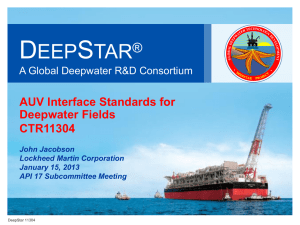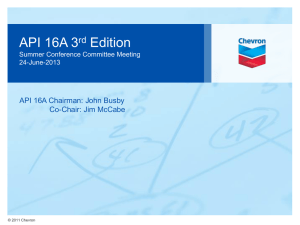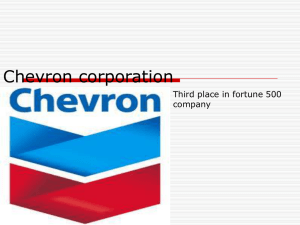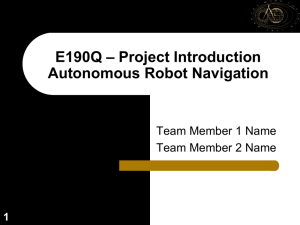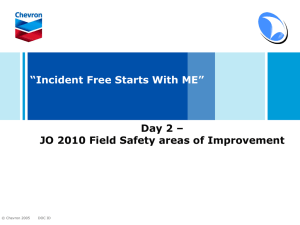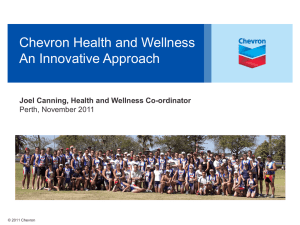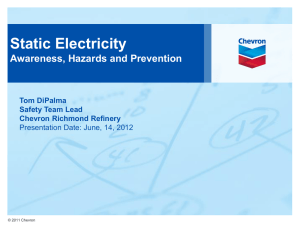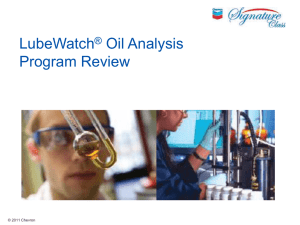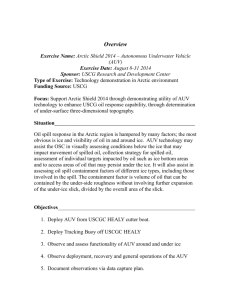DeepStar 11304 Brief to API 140115 Rev1
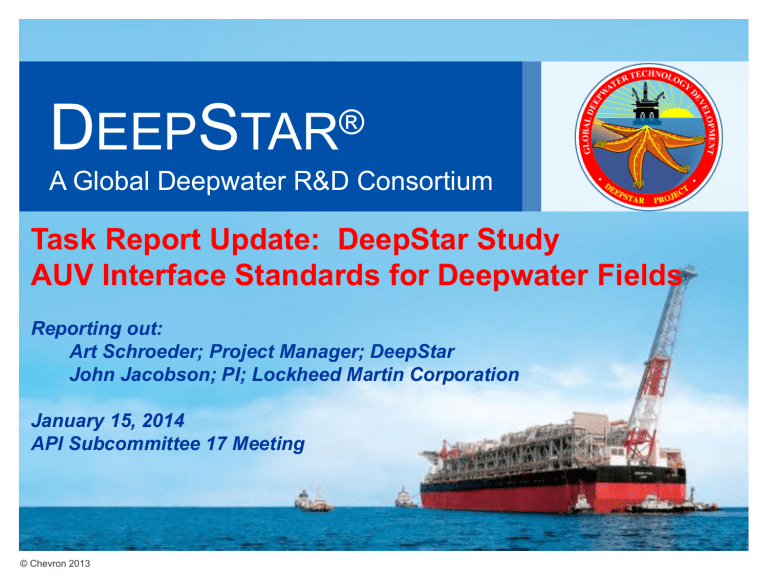
D EEP S TAR
®
A Global Deepwater R&D Consortium
Task Report Update: DeepStar Study
AUV Interface Standards for Deepwater Fields
Reporting out:
Art Schroeder; Project Manager; DeepStar
John Jacobson; PI; Lockheed Martin Corporation
January 15, 2014
API Subcommittee 17 Meeting
© Chevron 2013
Agenda
1.
Who is Funding this Work: DeepStar Organization
2.
Project Motivation and Objective
3.
Vision of Success
4.
Path to Develop Recommended Practice for AUV Interfaces
5.
Highlights from Draft RP
6.
Key Results and Next Steps
© Chevron 2013 2
DeepStar - 20 Years of Deepwater
R&D Excellence
DeepStar is an operator funded Research & Development collaboration between oil companies, vendors, regulators and academic/research institutes started in 1991
Vision
– Premier global forum to define deepwater technology needs.
– Execute development and adoption of deepwater technology projects.
Value
– Leverage financial and technical resources to:
Deliver technology needs
Build deepwater technical competency
Strategy
– Technology development aligned with business needs
– Transfer and apply technology to deepwater assets
– Gain acceptance of deepwater technologies by industry, standards organizations and regulators
© Chevron 2013 3
DeepStar Members
Phase XI (January 2012 – December 2013)
Phase XI Participants
Phase XI Contributors
2H Offshore Inc.
Aker Subsea Inc.
Alan C. McClure Associates
Alcoa Inc.
Altair Engineering Inc
American Bureau of Shipping
Amog Consulting inc.
Baker Petrolite Corporation
Battelle Memorial Institute
Bechtel
Blade Energy Partners
BMT Reliability Consultants
Bornemann Pumps
Cameron
Champion Technologies, Inc.
CSI Technologies, LLC
Daewoo Shipbuilding
& Marine Engineering Co., Ltd
DNV
Doris Engineering
EDG, Inc
Emas-AMC Inc.
Exmar Offshore Company
Floatec
Fluor Enterprises, Inc.
FMC Technologies
Frank's International, Inc.
GE Oil & Gas (Vetco Gray Inc.)
Genesis
GL Noble Denton
Granherne, Inc
GVA Consultants
Halliburton
Harris, Corp
Hytorc of Texas, Inc.
IntecSea
InterMoor Inc.
Knowledge Reservoir
© 2013 Chevron
Kvaerner Field Development
Lighthouse R&D Enterprises
Lockheed Martin, Corp
MagiQ Technologies
Magma Global Limited
Marintek USA, Inc
MMI Engineering
Moog, Inc
Multiphase Solutions Kenny, Inc
Nalco Energy Services
National Oilwell Varco
Nautilus International, LLC
Oceaneering International, Inc.
Oil State Industries Inc
Pipeline Research Council Int'l Inc.
Pulse Structural Monitoring, Inc
QinetiQ North America
READ ASA
SAAB North America, Inc
Saipem S.A
SBM Atlantia, Inc.
Schlumberger
Scoperta, Inc.
Seabox
SeaTrepid International, LLC
Siemens Energy
Silixa
Sonomatic, Inc.
Southwest Research Institute
Stress Engineering
Subsea 7
Texas A&M University
Trendsetter Engineering, Inc.
Universal Pegasus International
University of Houston
Water Standard Management
Weatherford
Wood Group Kenny
4
Project Motivation
The development of industry standards for AUV interfaces, similar to the API standards for
ROVs, will:
– Lead to compatible system designs by AUV vendors and field hardware manufacturers, and
– Enable safer, more efficient and cost effective operations of subsea fields.
Future capabilities and benefits of AUVs will be substantially enhanced through the use of standardized interfaces with subsea facilities
© Chevron 2013 5
Project Objectives
Project Objective:
– Identify subsea interfaces which should be standardized for AUVs
– Develop recommendations and preliminary drafts of interface standards
– Submit to API SC17
© Chevron 2013 6
Preliminary List of AUV Interfaces for Standardization
• Docking
• Power / Battery Charging
• Communications / Data Transfer
• Mechanical Intervention
Standardization Must Consider Both Greenfield and Brownfield Applications
© Chevron 2013 7
Vision of Success
API Adoption of DeepStar Task Report as Input to a Recommended
Practice.
Follow Outline for API RP 17H:
– Scope
– Normative References, Terms and Abbreviations
– AUV Interface Philosophy
– Design Performance
– Design Considerations
– AUV Interfaces and Subsea Systems
– Operational Considerations
– Indicator Systems
– Materials
– Documentation
– AUV Interfaces
– Informative Annexes
Deliver Draft RP Document to API SC17 in MS Word Format
© Chevron 2013 8
Path to Develop
Formal Recommendations to API SC17
Telephone
Surveys
Workshop
Formal
Submission to
API Planned for 1Q2014
Post-
Workshop
Assessment
Apply
Industry
Expertise
2 Month Comment Review
Cycle Completed.
Draft RP under Final
Review with DeepStar
Management
Draft RP
© Chevron 2013 9
Examples of Type 1 and Type 2 Docking Arrangements
Using Docking Base and Docking Structure
Vertical Docking
Configuration
© Chevron 2013
Horizontal Docking Configuration
10
Context Depiction
AUV Docking to Dedicated In-Field Fixture
© Chevron 2013 11
Context Depiction
AUV Docking to Field-independent Cabled Node
© Chevron 2013 12
Context Depiction
AUV Docking Integral within Subsea Facility
© Chevron 2013 13
Key Results and Next Steps
Summary of Results:
– Draft RP, formatted as a “Stand Alone” document following format of API RP 17H
– Key Sections include:
• Sect. 4.0: AUV Interface Philosophy and Functional Requirements
• Sect. 7.0: AUV Navigational
Requirements for Interfaces and
Subsea Systems
• Sect. 12.0: AUV Interfaces
Next Steps:
– Deliver DeepStar report to API upon completion of DeepStar reveiws
© Chevron 2013 14
Questions?
Contact:
John Jacobson
Lockheed Martin Corporation john.r.jacobson@lmco.com
713-243-5740
Contact:
Art Schroeder
DeepStar Project Manager artschroeder@chevron.com
713-372-2817
Contact:
Greg Kusinski
DeepStar Director gkusinski@chevron.com
713-372-1129
© Chevron 2013 15
